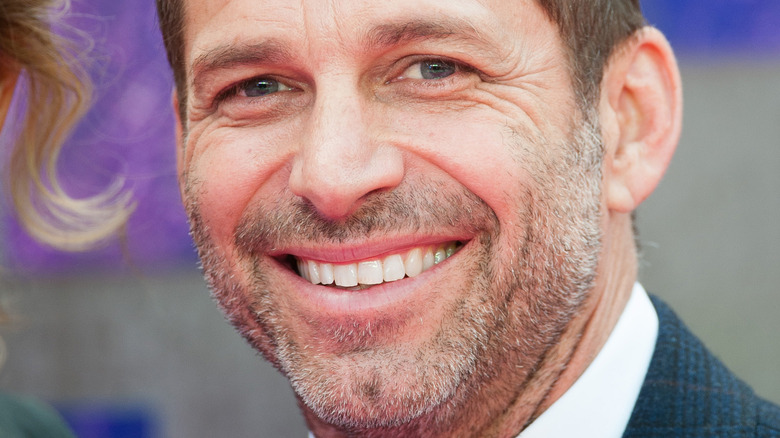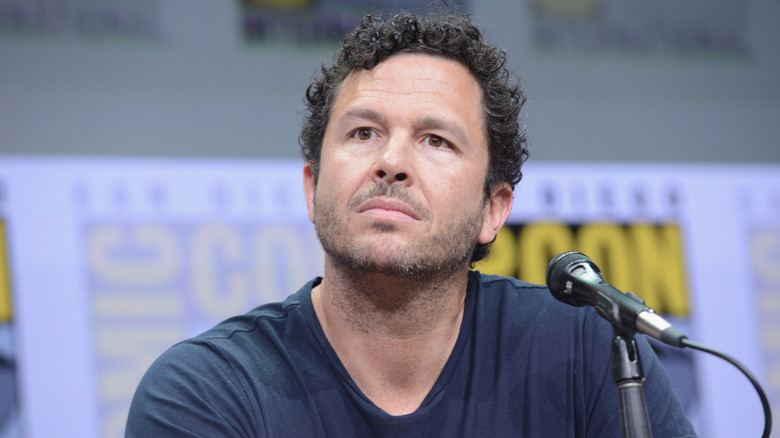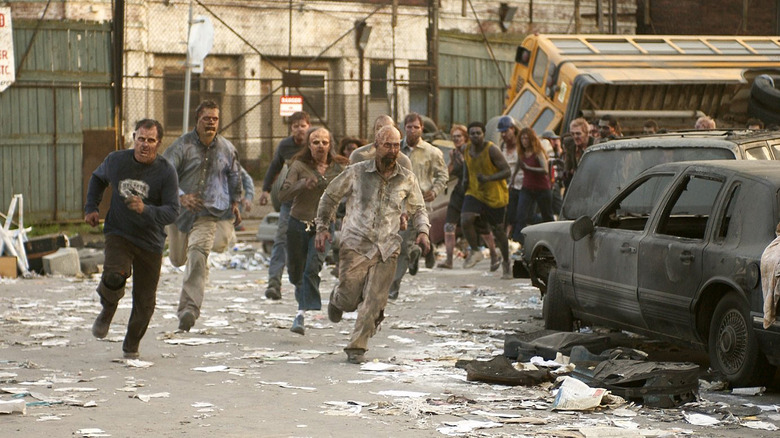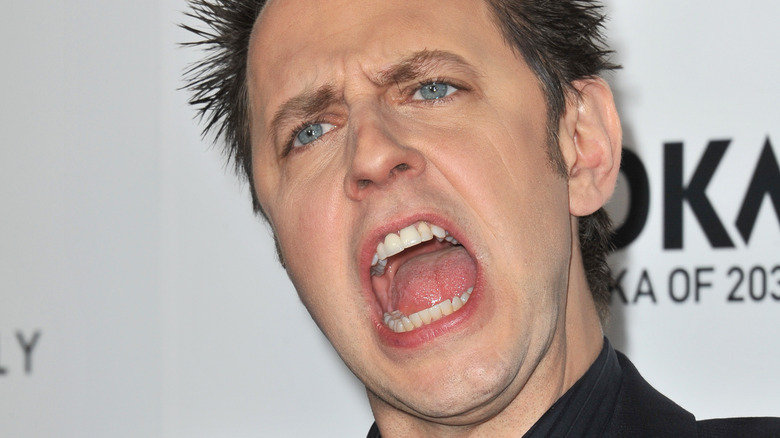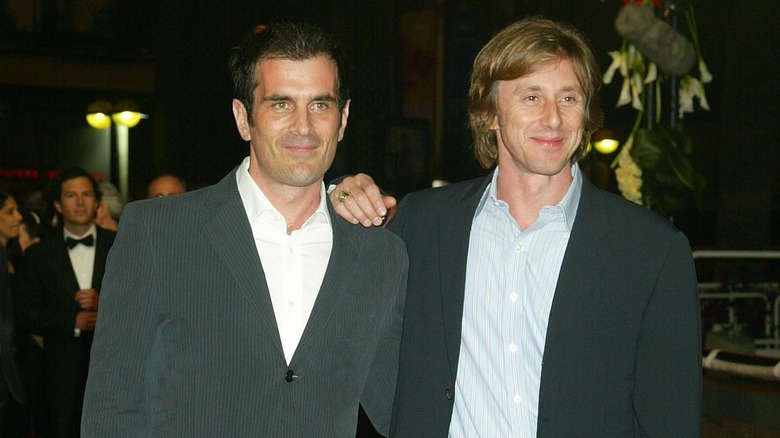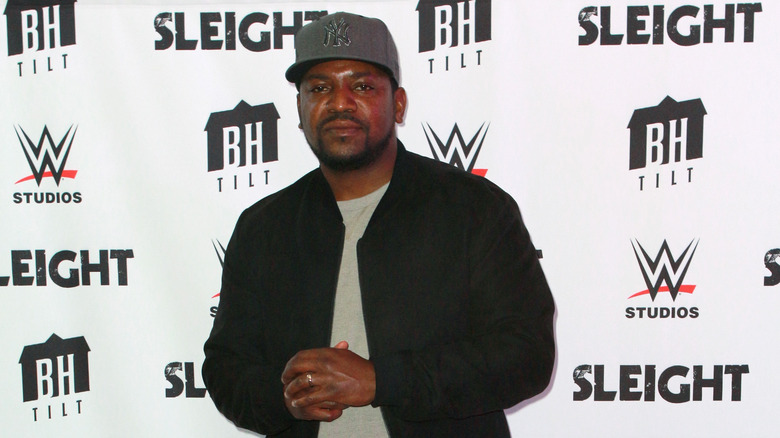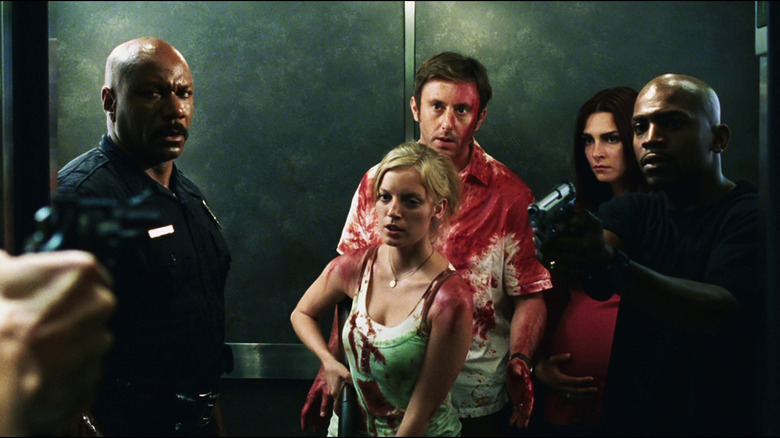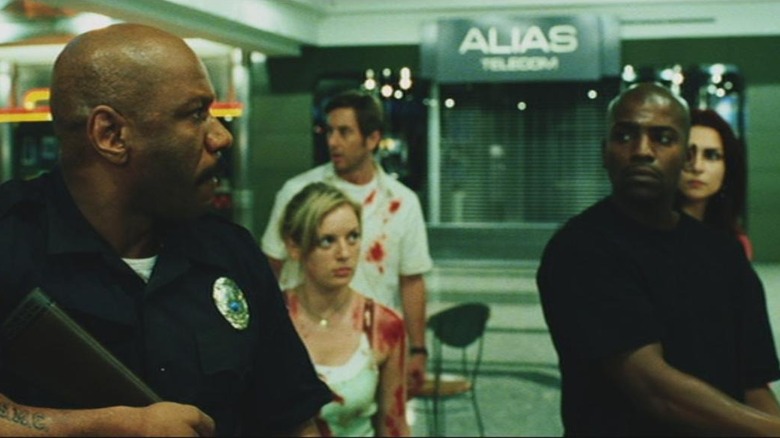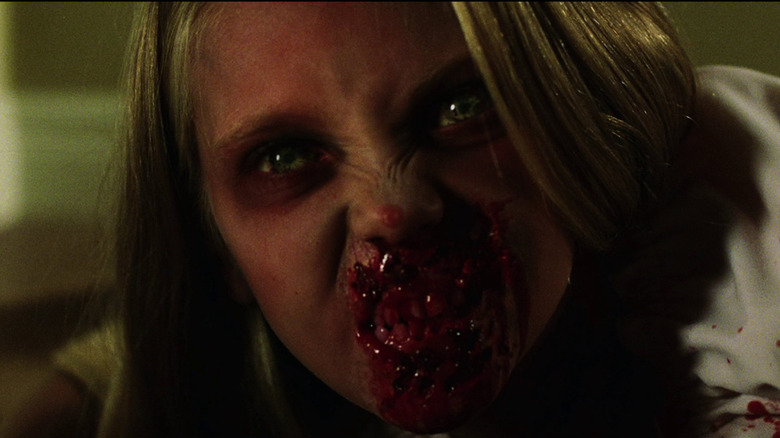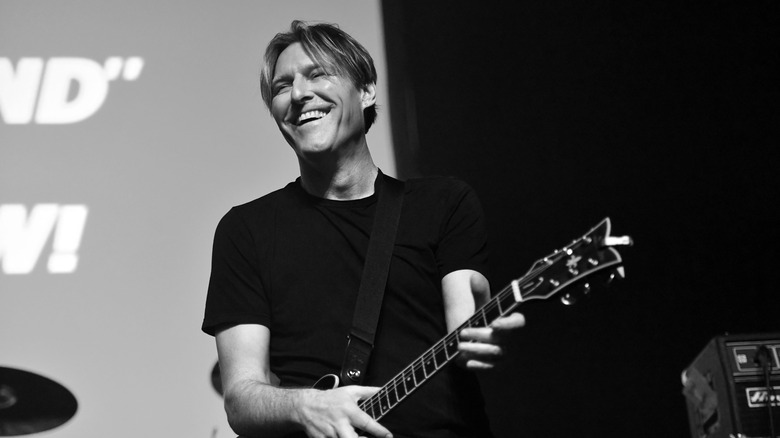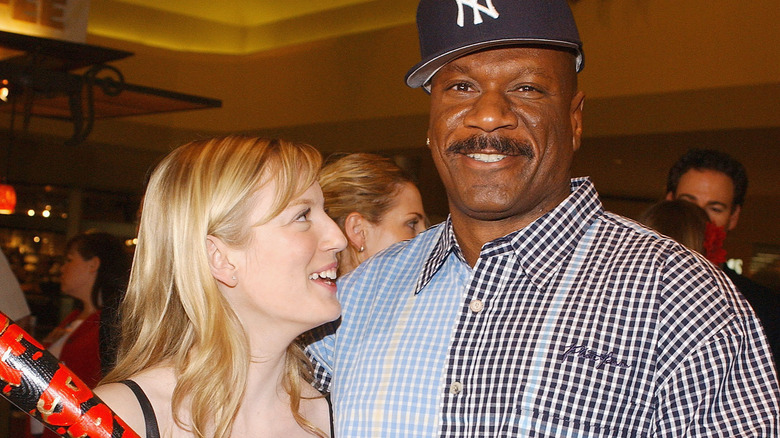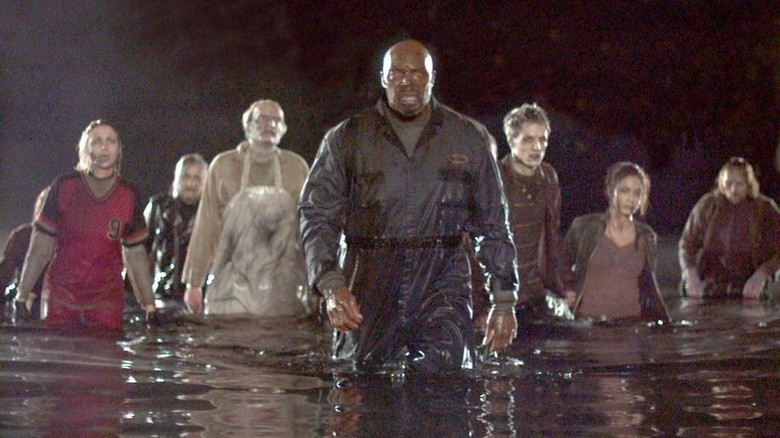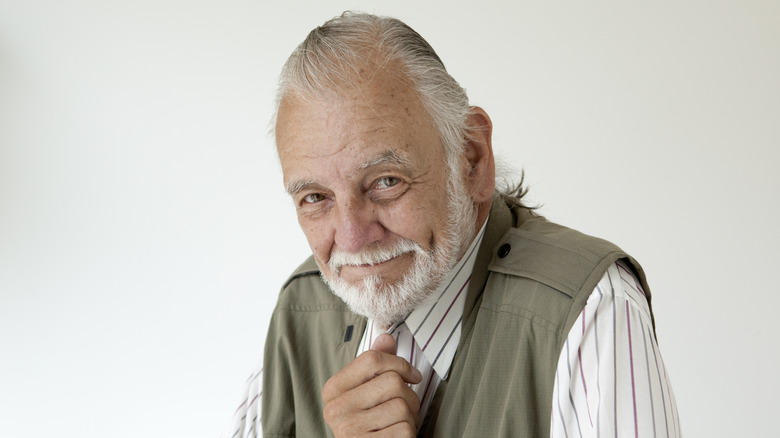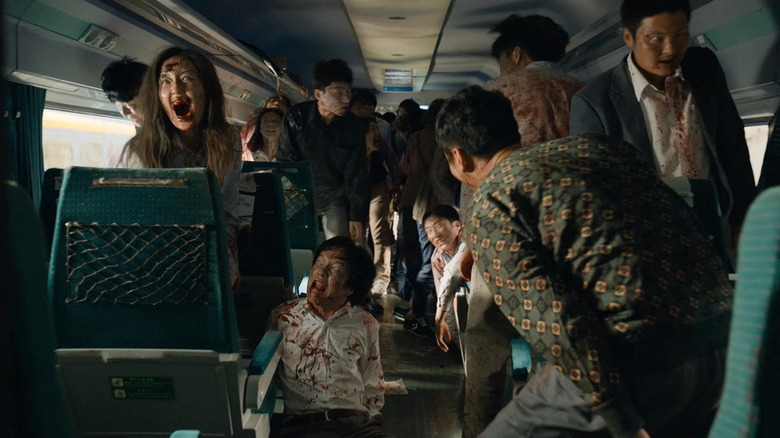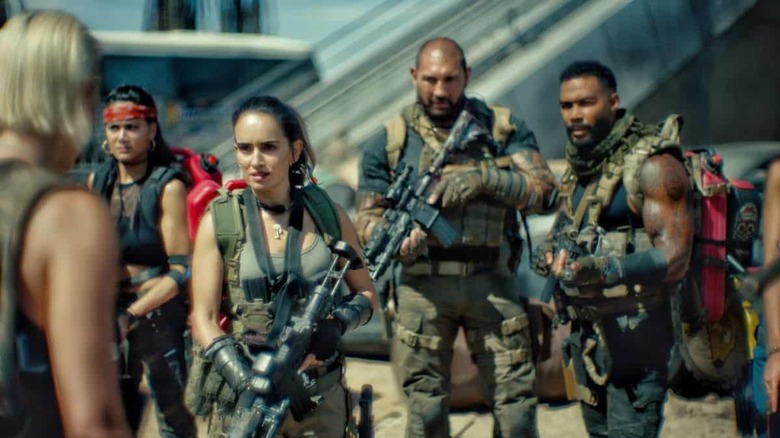The Untold Truth Of Zack Snyder's Dawn Of The Dead
The "Dawn of the Dead" remake is one of those films that fans often remember fondly, but some may forget it was the first major project from not one, but two, later masters of nerd-friendly action, Zack Snyder and James Gunn. In 2004, it was still many years before both filmmakers would tackle massive projects for DC and Marvel, but "Dawn of the Dead" firmly established them in the industry with a solid retelling of a horror classic.
Based on the second installment of the famous "Living Dead" series from revolutionary director George A. Romero, released back in 1978, the new version is also about a band of survivors who seek refuge within a mall during the zombie apocalypse. The commentary on consumerism remains, filtered through the sensibilities of Snyder and Gunn instead of Romero. These are the insider tales behind the way Snyder and his team took a beloved classic and made it their own, to the joy of a new generation of zombie fans.
Several offers for the rights were rejected
When producers Eric Newman and Marc Abraham reached out to the CEO of New Amsterdam Entertainment, Richard P. Rubinstein, he had already received many offers for the rights to remake "Dawn of the Dead." This time, Newman was able to convince Rubinstein that he would create a remake worthy of the original. But Rubinstein was still uncertain if the producer could pull it off, since he was working with Universal Studios.
In the official production notes of the film, Rubinstein explained his initial reservations, saying, "I believed that George's film was successful critically and financially partially because it was written, directed, produced and distributed outside of the major studio system of moviemaking. I was concerned that somewhere along the way a studio would sanitize Newman's vision for producing a version with 'attitude.'" Rubinstein added that he finally agreed to sell Newman and Abraham the rights after seeing how Abraham had preserved the integrity of many of the films he had produced over the years for major studios.
Dawn of the Dead was Zack Snyder's first feature film
Two years before Zack Snyder scored a massive hit with "300," he made his feature film debut with "Dawn of the Dead" in 2004. Prior to the zombie flick, Snyder had only worked on commercials and music videos, but producers Eric Newman and Marc Abraham thought he would be great for the job because of how enthusiastic and detail-oriented he was about the project.
In the Universal production notes, Snyder explained why he chose to take on the remake, saying, "I'd been looking for a project to direct as my first feature film, and I wanted something that gave me a reason to care about every shot. 'Dawn' did that. The most important aspect for me was that this movie had to be as serious as a heart attack." Although the ultimate goal was to strike fear in the audience, Snyder also admitted that he would have fun and incorporate some dark humor whenever it worked. Overall, the way the director articulated his solid vision for the movie left no doubt in producers' minds that they had the right person for the job.
Fans did not want James Gunn as screenwriter
When James Gunn was offered the job to write the script for "Dawn of the Dead," he could not have been happier. In the "Surviving the Dawn" documentary, the writer proudly admitted that not only did he love zombie flicks, but the second installment of George A. Romero's iconic undead series was his favorite of them all.
On the other hand, fans of the horror classic were not so pleased, to say the least. Gunn explained the rough situation he was in to Scream Factory, revealing that it was so bad that petitions began circulating demanding his dismissal and he even received death threats. He said, "It was an incredibly difficult time for me in my life because here I was, this guy who had always, you know, at least considered himself like I was the edgy, rock-and-roll screenwriter that I guess people think of me as today. But I had written the 'Scooby-Doo' movie."
Years before "Guardians of the Galaxy," "The Suicide Squad," and even his directorial debut with "Slither," the screenwriter was only known for penning not just one, but two "Scooby-Doo" films, which was unacceptable to many hardcore fans. However, opinions began to change after Harry Knowles of the then-highly influential site Ain't It Cool News read the script and said it was one of the best zombie movie screenplays he had ever read, even if he still believed it should not have been a remake of the original.
Two lead actors might have played each other's roles
One of the best aspects of "Dawn of the Dead" is how genuine the characters are on screen. The audience naturally feels great empathy for Jake Weber's Michael Shaunessy, while it is even easier to despise the arrogant businessman Steve Markus, played by Ty Burrell. Yet it is possible that the two actors could have had their roles reversed if different decisions were made.
When Burrell and Weber were auditioning for the movie, both tried out for the other's part at first. But as the duo revealed in "Surviving the Dawn," Weber came off as way too nice and Burrell was a much more believable jerk, so casting did hire them, but just switched their parts around. The two were also separately asked in private not to inform the other about the reasons for the change, but that obviously did not work.
Major cast members were not horror fans
Most of the stars of "Dawn of the Dead” signed up for the project even though they weren't particularly fond of the genre beforehand. Sarah Polley never openly stated that she disliked horror like her fellow cast members, but she did admit to some hesitation in doing a genre film until Zack Snyder and Eric Newman persuaded her (via EW) that the movie would be worth it.
Although both Ving Rhames (via IGN) and Ty Burrell simply stated that they were not fans of horror movies, with the former admitting that he never even saw the original, it is clear that their issue was with a lack of quality that they sadly associated with the genre. Yet each one of them saw something special in the film and wanted to be a part of it.
Mekhi Phifer was not speaking for his fellow cast members when talking with IGN, but his mentality was most likely very similar. While the actor respected classics like "The Omen" and "Poltergeist," he felt that the rest of the horror genre was riddled with inferior films. But to stress that his opinion on "Dawn" was different, the actor said, "I'm a big fan of good movies, and when I read the script, I was really intrigued. I knew it had some in-depth characters and could be different than something people were used to seeing."
Ving Rhames liked the multicultural aspect of the film
While talented figures like Zack Snyder and James Gunn wanted to make "Dawn of the Dead" because they were such fans of the iconic horror classic, veteran actor Ving Rhames cared little for the original, and even less for horror movies as a whole. Therefore, Rhames had a different reason for coming on board the project, which also happens to be why the movie has been popular with so many people who do not normally watch zombie flicks.
When explaining to IGN why he accepted the role, the actor said, "I thought it's bringing people from different ethnicities, different cultures together who need each other. So, when I look at the world, I really say unfortunately, sometimes it's an atrocity ... that forces us to come together." To Rhames, it did not matter that zombies were the reason for the apocalypse. All he cared about was the character-driven story of how people can overcome tremendous adversity if they set aside their differences.
It was filmed at a mall marked for demolition
Since the setting of the mall is such a pivotal part of the story, almost like another character itself, the filmmakers put a lot of effort into finding the perfect location to film "Dawn of the Dead." Several spots around the world were considered, from Los Angeles to Romania to New Zealand, until one was chosen in Toronto, Canada.
The mall was scheduled to be destroyed after shooting was over, so the crew were able to do whatever they wanted with the inside of the structure. One major task was that they had to gut most of the previous stores since the brands did not want to be associated with such a violent film. As shown in "Surviving the Dawn," production designer Andrew Neskoromny then organized the construction of new, fake storefronts in their place that looked so real that they have often been mistaken as genuine stores.
A large team of makeup artists worked on the film
CGI effects were used very sparingly in "Dawn of the Dead," which meant that an enormous number of extras were needed to serve as the hordes of the undead. In "Surviving the Dawn," special effects artist David LeRoy Anderson stated that on some days there were more than 300 actors on set, many of whom had highly detailed makeup and prosthetics to look like reanimated corpses that had undergone several levels of decay.
For an entire month, over 30 makeup artists worked for hours each day creating the zombies, which ranged from those with the most detailed prosthetics to the ones furthest from the camera, who simply had red gore splashed on them. The last of these extras were added quickly when necessary and hosed down with disgusting mixtures made to look like blood, vomit, and all sorts of vile stuff, so even they had a very impressive zombie appearance, especially from afar.
The soundtrack was brand new
While the "Dawn of the Dead" remake does have some aspects and themes similar to the original, the film in many ways stands alone as its own entity altogether. One key difference was the soundtrack, as composer Tyler Bates approached the music from the perspective that it was a completely new movie.
Bates had nothing against the music of Goblin from the score of the 1978 original — and in fact liked it — but made his decision because the films were such different animals. He told ShockTillYouDrop.com that he didn't think the music from the original film was compatible with the style, tone or filmmaking of the Snyder remake, explaining, "The Zack Snyder version had such a different attitude, and it had to become about something other than the consumerism and all that stuff that was going on in the original. I really let go of whatever the original was and said, 'That was cool and this is a different thing.'"
The cast had a great time on set
From the behind-the-scenes footage and interviews on the "Surviving the Dawn" documentary, it is clear that the cast had a blast together while filming "Dawn of the Dead." Several of the actors commented on how much they loved the environment throughout the experience, even though the subject matter was so dark and violent.
Mekhi Phifer explained, "We laugh and joke all day, it's a fun movie. I mean, it is very intense when you see it, but as far as the presence on the set, you know, we just have a good time." Ty Burrell agreed that jokes were commonplace and added, "Everybody's sort of laughing on set. I mean, so far, it's had like a great, great feel."
Both Ving Rhames and Michael Kelly truly appreciated how well the cast got along. Rhames said, "The actors, we are sort of a motley-looking crew together, but I think we have a very good chemistry." Kelly was clearly fond of the time he spent with his fellow cast, saying, "We have the best time and it's incredible. It's incredible how we all bonded so well too."
This paved the way for Land of the Dead
"Dawn of the Dead" did very well at the box office, especially for a debut feature from an unknown director, earning $102 million with a budget of only $26 million. The remake did not just help to revive the zombie subgenre in general, paving the way for pop culture milestones like "The Walking Dead," but it also helped George A. Romero directly when he was creating the fourth installment in his own undead series, "Land of the Dead," one year later in 2005.
Since Universal was the major studio behind both films and had plenty of cash to spare, Romero was also given a lot of money to play with for his first zombie movie since 1985's "Day of the Dead." Even though it was less than what Snyder's "Dawn of the Dead" cost, the $19 million that Romero had at his disposal was the most the father of zombie movies ever had to work with, according to Den of Geek.
George A. Romero wasn't impressed with the remake overall
Whenever a classic film is remade, it is always important to find out how the filmmaker of the original feels about the newer version. In the case of "Dawn of the Dead," George A. Romero has been very clear about his opinions. In an interview with Simon Pegg for Time Out, the director gave some praise and said he enjoyed the action, especially in the beginning of the film. However, Romero was critical of the rest, saying, "It sort of lost its reason for being. It was more of a video game. I'm not terrified of things running at me; it's like 'Space Invaders.' There was nothing going on underneath."
Later, Romero went into more detail with The Telegraph about why he did not like the film overall and emphasized how the remake not only had completely lost his original message, but much of the satire as well. The director explained that the Pennsylvania shopping mall in which the film was set was one of the first of its kind, with the film meant to be a critique of how such destinations would negatively affect society. He said, "The heart of the story is based in that. And I didn't think the remake had it." Romero also stressed again that running zombies made no sense to him. Yet even with all the criticism, the director did acknowledge that many fans love the movie and that he was aware of big names in horror, most notably Stephen King, who thoroughly enjoyed it.
It sparked a zombie craze in South Korean films
Zombie movies and TV shows have been very popular in South Korea over the last few years, with director Yeon Sang-ho's "Train to Busan" as one of the first to emerge in 2016. When talking with IndieWire, Yeon revealed that the "Dawn of the Dead" remake was his introduction to undead horror flicks and blew him away. He said, "That was when I started my interest in zombies. It's the most memorable and intense zombie movie I've ever seen."
With a meager budget of only $8.5 million when compared to Hollywood standards, "Train to Busan" raked in tons of cash at the box office, earning almost $100 million worldwide. After the massive success of his own zombie film, Yeon went on to release an animated prequel, "Seoul Station," along with a sequel a few years later in 2020 called "Peninsula." Soon after, Yeon was not the only one to focus on the new horror craze he started in the country, as Cho Il-hyung's "#Alive" and Kim Eun-hee's "Kingdom" were among many others released in South Korea over the following years.
Army of the Dead was originally the sequel
"Dawn of the Dead" was so successful that Universal Studios approved a sequel not long after its release. However, for several reasons, the script written by Joby Harold and Zack Snyder was set aside. By 2011, Matthijs van Heijningen Jr. had been set to direct the film with Snyder producing. When asked by Gizmodo about its status, he explained that the movie was going to cost a lot of money to produce, with the Great Recession of 2008 having a lot to do with its delay.
A decade later, Snyder teamed up with Netflix to finally make the film, "Army of the Dead," but the director, ultimately, turned it into a standalone tale instead of a continuation of the "Dawn of the Dead" storyline. When talking with Den of Geek, Snyder described the central premise, which remained the same over the years. He said, "I've always been a huge lover of those really insane, big, seminal genre movies, whether it be 'Planet of the Apes' or 'Soylent Green,' or 'The Omega Man,' or 'Escape from New York,' as well as mission movies like 'The Dirty Dozen,' which I love." With "Army," Snyder wanted to take parts from several of these beloved films and put them all together in his ideal zombie mashup.
